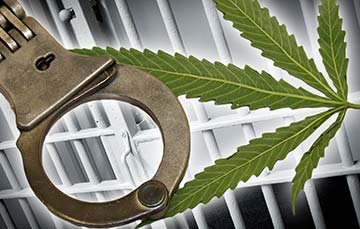Legalization of recreational cannabis in Canada is only a few months away, but it's going to take a lot longer than that to clean up the mess left behind from almost a century of prohibition. One of the most pressing issues has to be to wipe the slate clean for Canadians who have criminal records for possession.

When Bill C-45 (the Cannabis Act) was tabled, the government said there would be no general amnesty for past convictions. But now it seems the Liberals are starting to come to their senses – at least a bit.
At a cabinet retreat last week in London, Ont., federal Public Safety Minister Ralph Goodale said the government is examining the implications of possible pardons or record suspensions, but no action would be taken until after July 1.
Prime Minister Justin Trudeau, for his part, acknowledged that a lot of people have been harmed by having criminal records for possession of a drug that will soon be legal. But, in the same breath, he said that people will continue to be prosecuted for possession of marijuana until a "legalized and controlled regime is in place – not before."
Mr. Trudeau's dubious justification for this hardline approach is that "anyone who is currently purchasing marijuana is participating in illegal activity that is funding criminal organizations and street gangs."
The PM needs to be reminded that one of the principal reasons legalization makes sense is having a criminal record is a lot worse for a person's health than smoking pot. It can make finding a job, getting a bank loan and travelling much more difficult, not to mention that prosecuting people for buying a few grams of pot to get high is a tremendous waste of police and court resources.
For decades now, tens of thousands of people a year have been busted for possession. Racialized and low-income Canadians have been disproportionately prosecuted and harmed.
In 2016 alone – after it was clear that cannabis would be legalized – there were 55,000 cannabis-related charged laid under the Controlled Drugs and Substances Act – 76 per cent of them for simple possession – according to Statistics Canada. That number has been falling for years as police and prosecutors began to recognize the absurdity of the law. Judges have also increasingly imposed suspended sentences and small fines.
In other jurisdictions that have legalized cannabis, such as California, they simply removed the crime of possession from the books – and did so retroactively. They also reduced penalties for cultivating and selling cannabis.
Canada is taking a much more convoluted and outdated approach. Under the Controlled Drugs and Substances Act, there are currently eight cannabis-related offences, such as possession, trafficking, importing and exporting. Under the Cannabis Act, there will be 45 offences, and many penalties will be far stiffer.
Under the new law, it will be legal for individuals to possess up to 30 grams (one ounce) of cannabis and grow up to four plants for personal consumption. (Those rules, however, vary a bit by province.)
Cannabis will be highly regulated; the new legal regime does not create a laissez-faire environment. For example, public possession of more than 30 grams of pot will be a crime, as will "unauthorized promotion."
The new law will also create something called "illicit cannabis" – covering all products that are not purchased in a provincially-regulated store, or grown legally. If you distribute "illicit cannabis" to a minor, i.e. share a joint with a teenager or sell them a bit of pot, you could face a $15,000 fine and 18 months in prison for a summary offence and up to 14 years in prison for an indictable offence.
By comparison, selling liquor to a minor will land you a maximum fine of $10,000 in most provinces.
Selling cannabis without a licence will also be a crime with stiff penalties – up to 14 years in prison – which could prove problematic for dispensaries in provinces that are creating a state-run monopoly, such as Ontario and Quebec. Ontario, which has vowed to shut down dispensaries, has also threatened additional fines of up to $1-million.
In the U.S. jurisdictions that have legalized marijuana – six states and three more coming in 2018 – criminal charges have dropped sharply. But, in Canada, that's not a given, and that's most unfortunate. Ottawa needs to not only expunge the records of those who have been charged with possession in the past, but ensure it does not perpetuate the morally and rationally-untenable litany of prosecutions of recreational drug users that are the hallmark of the failed war on drugs.
André Picard
The Canadian Press
Jan 15, 2018
Hi! I am a robot. I just upvoted you! I found similar content that readers might be interested in:
https://www.theglobeandmail.com/opinion/canada-needs-to-clear-the-air---and-wipe-away-criminal-records-for-marijuana/article37605181/